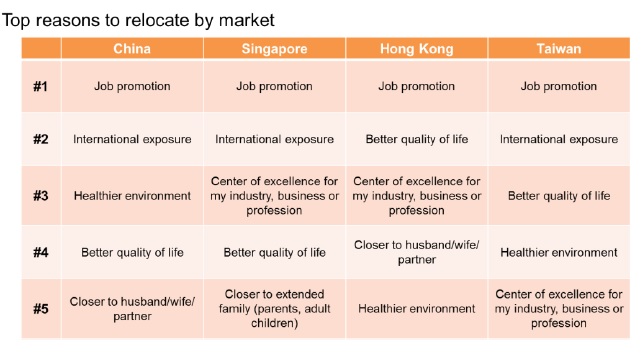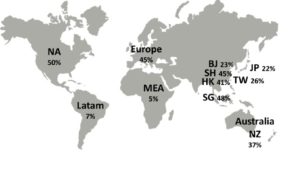

Hong Kong managers are the most content in Asia to stay put, with other territories reporting high intentions to relocate. In Taiwan, over 60% report an intention to actively pursue a move to another city, region or country. This, according to the MRIC Group’s 2015 Talent Mobility Briefing compiled with the results of its fifth annual Talent Survey. It gave an insight into the intentions of more than 4,500 mid- to senior level managers and professionals working in Greater China and Singapore.
Motivation for change
Across age brackets, industries and markets, the number one motivation for professionals to uproot and relocate is in pursuit of a job promotion. The second incentive in all age brackets is international exposure. Beyond this, those aged below forty stated their priority would be to attain a better quality of life, followed by proximity to loved ones.
JB Aloy, Senior VP, Ipsos commented, “The search for a better quality of life is actually disconnected from family life as illustrated by the fact that single professionals are particularly looking for this relocation benefit.”

Particularly among Hong Kong respondents, an improved quality of life was a key consideration. Mainland Chinese participants indicated that their third most important reason for relocating would be seeking a healthier environment.
Preferred destinations
Although North America was found to be the preferred destination, with half of the professionals surveyed willing to relocate there. This represents a shift from the 2012 Talent Report, moving up one space. Singapore came a close second as a destination of choice for 48% or respondents. In joint third came Europe and Shanghai, with 45%, followed by Hong Kong at 41% and Australia/New Zealand at 37%. Now at #5, Hong Kong has dropped from #3 in the previous survey.
Professionals under 30 were found to now prefer Europe and North America over Shanghai and Hong Kong. Those aged under 40 are increasingly interested in Australia and New Zealand.
Mainland China shaping rankings
The overall rankings were logically influenced by Mainland Chinese preferences, due to the job market size and their weight in the survey sample. It was found that Mainland Chinese respondents are seeing Singapore as more attractive—moving from fifth place to third—though it remains as attractive to Hong Kong respondents and Taiwanese respondents. Shanghai has become less attractive to the Mainland Chinese respondents—moving from first place to fourth—and Beijing has become far less attractive dropping from sixth to eigth. Its popularity also fell in Hong Kong—from sixth to ninth, in Singapore from ninth to eleventh and in Taiwan from sixth to ninth.
More people moving away from than to China
Twice as many people relocated from rather than to China in 2014, according to the International Movers Study released by UniGroup Relocation. The study tracks customers’ global moving patterns over the course of the past year.
The US is both the top destination for people moving from China and the top origin country for those moving to China. However, moves from the US to China decreased by more than 22% compared to 2013. At the same time, fewer people moved from China to the US in 2014 than 2013.

Quan Heng, Research Professor, Shanghai Academy of Social Sciences, commented, “One important factor that affects international movers is the economic development and structural changes of origin and destination countries. One reason for the decrease in moves between China and the US is the robust economic recovery in the US in 2014, bringing business opportunities and a positive outlook. The drop in moves to the US also relates to China’s reform and potential growth rate.”
Mainland China professionals’ preferences
The destination ranking used to be dominated by Shanghai and Hong Kong—it is now more international with very positive ratings about Europe and Singapore.
There are some minor changes when it comes to mainland cities: Beijing remains the number 2 destination in China but the capital city is distanced by Shanghai. Guangzhou, Zhuhai and Foshan are slightly up in the ranking, whereas Qingdao, Tianjin and Ningbo are slightly down.
Returning Malaysians
According to the latest annual Global Salary Survey from Robert Walters, the employment market in Malaysia is likely to remain largely candidate-driven in 2015, with top performing professionals commanding multiple job opportunities as well as counter offers.
Local companies have also increasingly shown keen interest in hiring overseas nationals due to their global exposure and knowledge of the domestic business culture. This was largely a result of strong initiatives from the Malaysian government agency TalentCorp—which actively engaged with local talent working overseas under its Returning Expert Program. In 2014, these skilled candidates were particularly in demand within the IT, finance and banking sectors. A prevalent awareness for returning Malaysians is expected for 2015—which will widen the local talent pool.
The Survey suggests that, on average, professionals who secure new positions will expect a 10–20% salary increment in 2015. However, if demand continues to exceed supply, candidates are likely to receive counter offers which will drive salaries up further.
Sally Raj, Country Manager, Robert Walters—Malaysia commented, "Malaysia enjoyed healthy growth due to expansion within the shared services industry and the entrance of multinational hubs. This was largely attributed to the government's policies which allow ease in setting up business operations. As a result, we also saw more intense competition between organisations for top talent. To address the demand for quality Malaysian professionals in a limited candidate pool, companies have turned their attention to attracting local overseas talent to strengthen the domestic workforce."
It looks likely that the mobility of professional workers in Asia and globally will only increase as travel becomes cheaper and easier, developing economies grow stronger and employers worldwide expect more exposure and experience on CVs. What remains to be seen is whether the phenomenon or returning to the homeland will continue or if the concept of nationalism will be forever changed.





